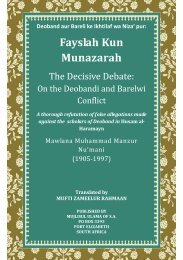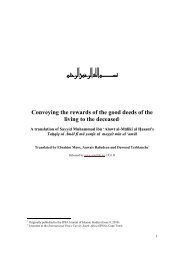al_etidaal_gn
al_etidaal_gn
al_etidaal_gn
Create successful ePaper yourself
Turn your PDF publications into a flip-book with our unique Google optimized e-Paper software.
17. “To any that desires the crops of the Hereafter We give increase in his tilth; and to<br />
any that desires the tilt/i of this world, We grant somewhat thereof, but he has no share<br />
or lot in the Hereafter.” (42.20)<br />
All these verses as well as others f’om the Holy Quran have this collective theme that for<br />
the non-believers the ultimate go<strong>al</strong> is the acquisition of the life and enjoyment of this<br />
world. For them only the benefits of this world are considered benefits. They have no<br />
faith in the Hereafter. If some denominations or sects do accept the Hereafter, then<br />
because of not fulfilling the conditions for proper Imaan, it is not acceptable at <strong>al</strong>l. Hence<br />
whatever they receive from Allah is given to them here. Whatever good works they<br />
perform are rewarded in this world.<br />
Once someone inquired from Sayyidina Abdullah bin Abbas (Radi<strong>al</strong>lahu anhu) what was<br />
the meaning of the verse from Surah Hood:<br />
“Those who desire the life of the present and its glitter - to them We sh<strong>al</strong>l pay (the price<br />
of) their deeds therein - without diminution. They are those for whom there is nothing in<br />
the Hereafter but the fire: vain are the desi<strong>gn</strong>s they frame therein, and of no effect are the<br />
deeds that they do.” (11.15,16)<br />
He replied: “The reward of their good deeds is given to them in the form of he<strong>al</strong>th in<br />
body, in their offspring, children and grandchildren, and in their enjoyment in riches.”<br />
The theme of this verse is strongly linked in meaning with the verse from Surah Bani-<br />
Israel:<br />
“If any do wish for the transitory things (of this life), We readily grant them - such things<br />
as We will to such persons as We will.” (17.18)<br />
And Allah grants to whomsoever He wishes, without compulsion from anyone. Sayyidina<br />
Sa’eed bin Jubair (Radi<strong>al</strong>lahu anhu) <strong>al</strong>so gave the same meaning to the above verse from<br />
Surah Hood, Hazrat Qatada (Radi<strong>al</strong>lahu anhu) is of the same opinion. viz., that they will<br />
receive the reward for their good deeds in this world, so much so that by the time they are<br />
in the Hereafter, no righteous deed is left unrewarded. As for the believer, he sh<strong>al</strong>l<br />
receive his reward in this world (and because of having Imaan) as well as in the<br />
Hereafter.<br />
Mujahid is another one who says that non-believers receive their rewards for good deeds<br />
in this world.<br />
Maymoon bin Mehraan says: “Whosoever wishes to see his standing with Allah should<br />
cast a look at his deeds, because he will be treated according to his deeds. Everyone -<br />
believer or non-believer will surely be rewarded. However a believer will be rewarded<br />
here as well as in the Hereafter, whereas the non-believer will be rewarded only in this<br />
world.” (Durr Manthoor)<br />
Al- Eti’da<strong>al</strong> Fi Maraatibur- Rija<strong>al</strong> 80




